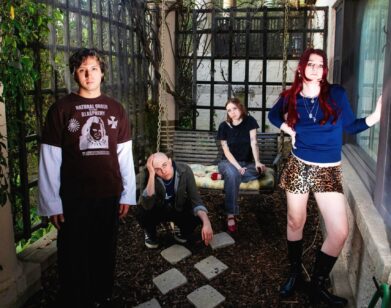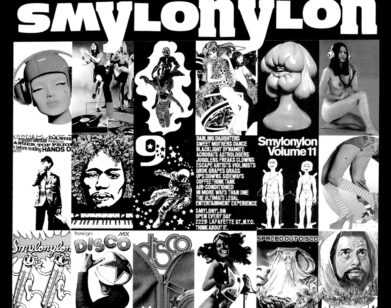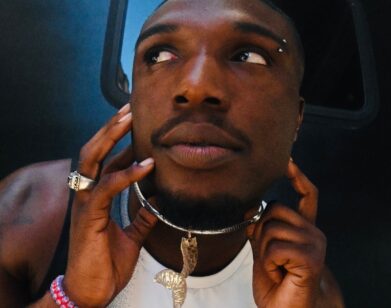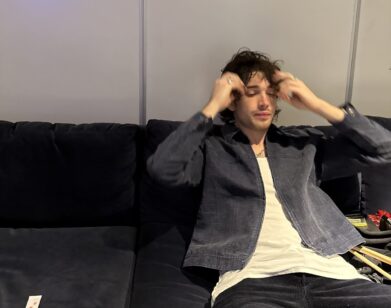The Keys to Kingdom
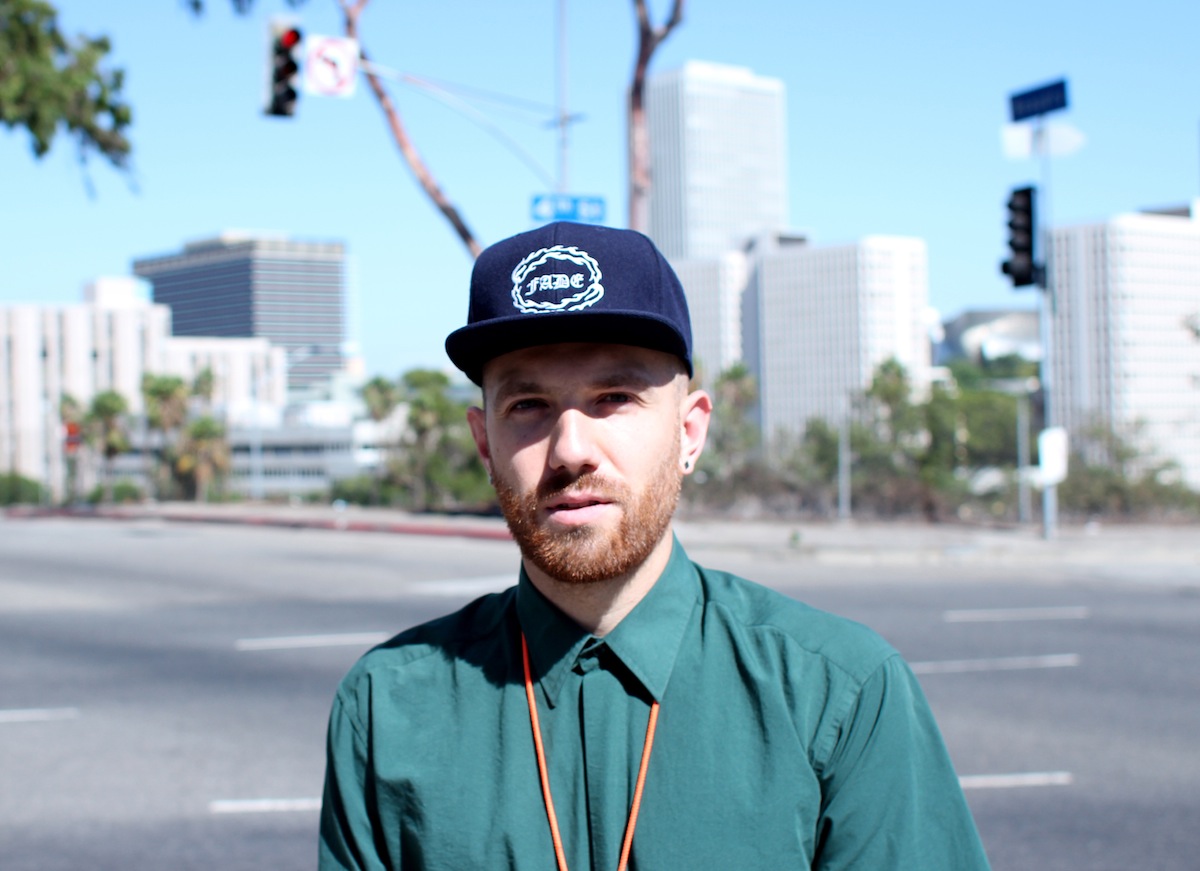
ABOVE: EZRA RUBIN, AKA KINGDOM. IMAGE COURTESY OF DAVIS KIRKLAND
“It was all in my head,” L.A. producer and label head Ezra Rubin (aka Kingdom) says of his musical beginnings. “Sometimes I think that’s what my music is like: a fantasy of an imagined club.” For his fifth EP, Vertical XL, no description is more fitting. Blending elements of grime, jungle, and R&B with sci-fi and fantasy, Vertical XL takes Rubin’s music further than it’s gone before. “There’s a lot of ascension,” Rubin confirms. “I want it to feel like you’re crossing a lot of terrain.” With vertiginous bass, knocking drums, and L.A. vocalist Kelela’s voice pushing the record to its upper limits, it’s hard to hear this slim, seven-track EP as anything but epic.
Ahead of Vertical XL‘s release this week, we caught up with the producer and the topics of conversation—from fantasy to reality TV—were as varied as the record’s sound.
ERIN BRADY: Where are you currently located?
EZRA RUBIN: I was living in Brooklyn for almost 10 years and then I came to L.A. about three years ago to start the label, [Fade to Mind].
BRADY: Has starting Fade to Mind influenced this latest EP?
RUBIN: The A&R [artists and repertoire, or talent scouting] side of being the label, all it’s done is maybe distract me from my composition work and being a musician. No shade to the label at all. Starting the label and forming the mission statement along with my business partner, Prince William, that has influenced my music. We set out to make a new kind of club music, an experimental club music that’s really open-ended. It still bangs in the club, but can create a lot of different emotional states. I wanted to keep in mind with this record. This wasn’t any Kingdom EP, this was my first EP for my label. I wanted to make sure that it had [the mission statement] fused into it. There is an experimental side to each song, but there’s also a bass-y, club-ready side.
BRADY: Does being a producer affect how you listen to music?
RUBIN: Yeah, it makes it hard to listen to music sometimes if something’s not mixed right. I really start to zoom in on the random-est parts of a song, and it’s all I hear for a while.
BRADY: How did you meet Kelela?
RUBIN: Ashland (aka Total Freedom) invited her to sing at one of his events. At that point she was just playing instrumentals off of her iPhone and singing over them freestyle. So, I saw that performance and met her.
BRADY: What are some of the influences on this EP?
RUBIN: There’s the R&B side, for sure, which is expressed in “Bank Head.” The song “Take Down Notice” is almost like a Ginuwine-style slow jam. Throughout the EP, you can also hear a little bit of an industrial influence. You’ll hear metal sound effects and some moments where it’s really aggressive and repetitive, like a machine sound. With “Take Down Notice,” I wanted to make a slow jam, but that was set in a factory setting. With “Corpse” and “OG Master,” I was thinking a lot about in the mid-2000s and hearing music coming out of cars when I was living in New York. There’s all that mixed in and maybe a little ’80s funk, something warm and smooth—maybe that’s the California part. There’s something lush and warm and melodic that I like to drip on top of it, too.
BRADY: Is there a unifying theme?
RUBIN: In terms of the initial theme, I kind of just let it form. I made maybe 20 demos and then I just noticed that these had a thread that carried through. I saw it as an epic tale. You start by finding this goddess or angel figure, which is Kelela, and then you journey down to like a dark moment where you find a dead body in “Corpse.” For some reason, I see it as an outdoor experience, like you’re on a mountain.
BRADY: Can you describe your composing process?
RUBIN: I was a drummer first. I never had a problem tapping out rhythms. My problem was tapping out too many rhythms—in classes and family dinners and stuff like that. To me, that’s natural, so I usually start by just tapping out drums and looping them and layering them. For me, it always starts with the drums, and I build from there.
BRADY: What’s your favorite sound on the record?
RUBIN: It sounds like a big iron door closing, and then maybe a piece of metal falls off the door after you close it and clangs on the ground. It feels like a rejection, like you’ve just been shut out of the palace.
BRADY: How did you make that sample? Did you actually find a giant metal door?
RUBIN: [laughs] That’s the next step. For now, it’s just a couple of different sound effects layered.
BRADY: There’s a cinematic quality to some of the songs on this EP; were you watching anything in particular?
RUBIN: There wasn’t a lot of stuff I was watching. I don’t know. Maybe that comes from the L.A. part too. Maybe it isn’t so much watching movies, but actually having space—the desert, the mountains, and the ocean. When it comes to watching stuff, I spend a lot of time watching reality TV and weird garbage. That’s what entertains me most. I do also love sci-fi. I enjoy special effects and that whole side of things, you know, skipping through bad high-budget sci-fi blockbusters just to watch the crazy computer-generated moments.
BRADY: What’s you musical guilty pleasure?
RUBIN: From the time that I started putting my music out in 2007 to now, the EDM thing has gotten so crazy. Back when I started doing dance music, people in America only knew, like, Darude’s “Sandstorm” and La Bouche. Now, everyone’s all about these big EDM acts. To me, there’s something kind of cool about it, because when I was a teenager it was a fantasy of mine that techno and jungle would be really big and popular. That’s not quite what happened. It’s a different kind of music, but it’s still fun to watch America discover rave music for the first time basically. I guess Skrillex and Swedish House Mafia are my guilty pleasures. It’s an American thing right now to participate in that.
BRADY: Were you a club kid growing up?
RUBIN: I grew up in a really small rural town in Massachusetts. There were options in Boston, but since I was under 18, I couldn’t really go to clubs. It was all in my head. I fantasized about what it would be like. Sometimes I think that’s what my music is like: a fantasy of an imagined club. I moved to New York when I was 18 to go to school—I went to Parsons—but by then, the New York club scene was considered by most to be dead.
BRADY: I like the description of your music as an under-18 fantasy of a club. I think that’s better than the actual experience.
RUBIN: [laughs] It often is.
BRADY: Why do you make music?
RUBIN: Because it makes me happy. Because I love it. There are so many people making music to conform to genres and to certain sounds, and I just love to try to mess with that and mess that up. Also, I do love to DJ. I love to be able to create something and then bring it to a club that night to test it out or mix it with my friend’s track. I like being part of a community of artists like Fade to Mind or Night Slugs and being able to trade tracks with people. I like the social element of it.
VERTICAL XL IS OUT TODAY ON FADE TO MIND. FOR MORE ON KINGDOM, PLEASE VISIT HIS WEBSITE.



